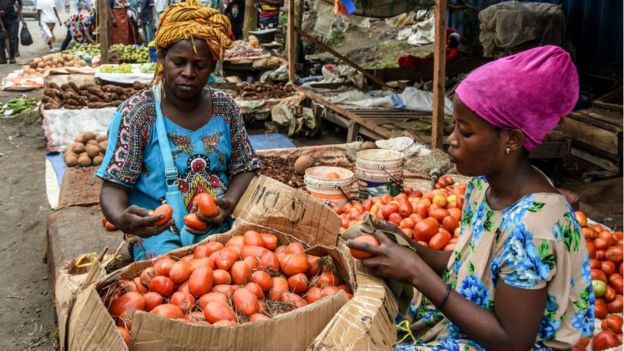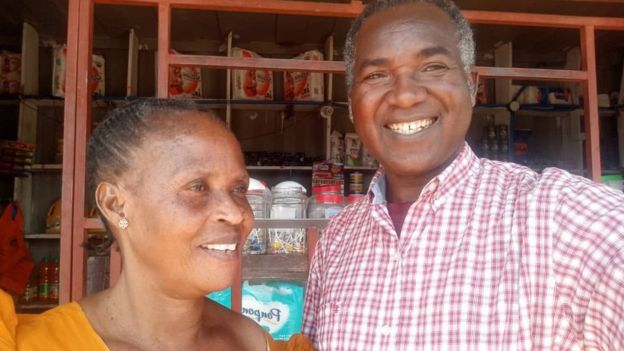‘My Tanzanian family is split over coronavirus’
BBC Tanzania reporter Sammy Awami writes that President John Magufuli’s faith-based approach to coronavirus has caused tension in his family.
Since the first case of coronavirus was confirmed in Tanzania in March, I have been bombarded with messages and phone calls from colleagues, friends and family members living abroad.
They’ve been wondering: how did a country with some of the most relaxed coronavirus measures in Africa manage to so far escape the kind of crisis which has visited many parts of the world.
It’s a question puzzling even those of us who are living in the country.
President Magufuli was among the few leaders who declined to impose any sort of lockdown and has scorned what he’s termed unnecessary panic in other countries.

Yet, despite what many of his critics – and the more anxious among us – feared was a woefully reckless approach, the nation seems to have avoided for now the catastrophic number of deaths that many anticipated.
The most confusing thing about all of this, is that no-one really knows how.
‘Prayers are true healing’
One of the issues is that we don’t have any figures to go on.
President Magufuli chose to put statistics in lockdown rather than people.
As analyst Aidan Eyakuze said: “He officially made the country operate in data darkness.”
Three doctors I spoke to off record said hospitals had not been overwhelmed.
Some would argue that they support the government’s narrative because of fear of possible retaliation if they were to speak out.
The president of the Medical Association of Tanzania, Dr Elisha Osati, has said there has never been a cover up, but he now wants to run for parliament as a candidate for the governing Chama Cha Mapinduzi party.
In a situation where the government is not releasing figures and journalists cannot access health facilities to investigate independently, it’s the doctors’ word against their doubters.
While some government health officials warned the public that the virus posed a real threat and urged them to follow basic hygiene guidelines, the president encouraged people to carry on with their business and pray to God for protection.
As a devout Catholic, he told a congregation of worshippers that prayers are where “true healing” is found, and the disease had been been “eliminated thanks to God”.
The president’s stance made things awkward between me and both my immediate and extended family.
Most of my close relatives are supporters of the president and all of them are die-hard, thoroughly devout Christians.
‘WhatsApp battleground’
From the very start of the outbreak, when daily reports of case numbers started to climb, I became increasingly worried about their safety.
But the creeping politicisation of coronavirus in the country made it hard to convince some of my loved ones that they needed to take precautions.
The family WhatsApp group became a battleground.
It was flooded with a cocktail of re-shared media supporting the president and pseudo-science urging people to throw caution to the wind and hope for the best.
They were also anxious about the loss of income that could result from a fierce lockdown.
And as we learnt of the police brutality used in neighbouring countries to enforce such restrictions, this was only compounded.
Take three of my uncles for instance, all of whom are full-time pastors.
For them, the church is not only their core spiritual and social community, it is also their main source of income.
‘I tried to educate older relatives’
My parents run a convenience store in their neighbourhood in the capital, Dodoma.
It’s their sole source of income and a spot where they meet with their neighbours and friends on a daily basis.
Because they are older I was concerned that their daily movements put them at risk.

So, I set out to craft WhatsApp messages tailored to older family members to try to educate them about the pandemic, and convince them to stay at home.
Unlike people living in other countries, they do have a choice.
Do they listen to me, stay at home and lose their livelihood? Or follow the president’s advice to carry on their business and pray for the best?
‘Inventing a new enemy’
Of course they believe the virus is deadly. But they also believe in prayers – perhaps even more so when their earnings are on the line.
In a country where almost everyone identifies with one religion or another, and where the majority of people live hand-to-mouth, the president honed in on faith and income to promote his strategy.
The president also made sure to invent a new enemy in the fight against the pandemic – the West.
In one of his freestyle speeches the president even suggested that the West could plant the virus on imported goods just to hurt Tanzanians”



